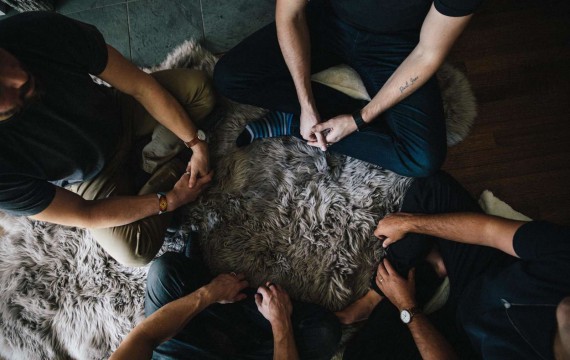Ever thought of joining (or being in) a weekly men’s group? Do you hear the concept of men’s groups popping up more and more in the cultural lexicon and you’re curious as to what they’re all about?
Over the last four years I have been a member of a weekly men’s group. I have mentioned this in a few articles through the years, and I’ve been getting more and more questions about it lately. So I’m going to address all of these frequently asked questions regarding men’s groups in this deep dive article.
What Is A Men’s Group?
A men’s group is when a group of men meet regularly in order to better themselves as individuals.
It is not a spiritual group, though spiritual things certainly can take place. It is not a therapy group, even though therapeutic benefits do occur for all who attend. It is not a self-help group, even though selves do get helped.
It is simply a regularly held group container wherein men are able to heal parts of their psyche, and become sharper, wiser, and more well rounded as people.
What Is The Point Of Being In A Men’s Group?
One of the most common questions that I get asked when people outside of my men’s group community hear what we do, they simply ask, ‘Why?’, (which is then quickly followed by, ‘What do you do?’).
Every man comes into a men’s group with a different primary intention.
Some men come looking for support because they are in a rough patch in their lives and want to feel seen and supported by others. Some men come to a men’s group because they know that they have an unhealed father wound (say, from an absent father in their childhood) and they want to heal this wound by engaging with other healthy men in real time. Other men come in to a men’s group because they are tired of lone wolf’ing their lives and want to engage with community/friendship in a deeper way.
While every man comes in with a varying set of intentions, the healing benefits of being in a regular men’s group are quite predictable and consistent.
Many men experience healing in their relationship to their fathers, in their relationship to men in general, and in their relationship to themselves. It’s also common for men to become lit up and inspired about their lives, taking on greater aspirations or finally making an overdo decision (ex. leaving an abusive relationship or changing career paths).
What I Have Personally Gotten Out Of Being In A Men’s Group For The Last Four Years
While I experienced all of the aforementioned benefits (increased fire and drive in my life, trusting men more, etc.), the biggest benefit that I personally gleaned from my experience in a men’s group was something that I never expected.
In short, I realized just how remarkably un-special I was.
I first joined my men’s group with a huge ego. I was a fresh-faced 28 year old, with a chip on his shoulder because I was a young, brilliant and successful person.
“Oh, you haven’t heard of me? I’m a five time best selling author. My blog gets a million readers a month. No big deal.”
While I was never that directly arrogant, my energy/vibe wasn’t far off from that.
When I first joined my men’s group, I had a truckload of judgments for the majority of the men who sat in circle with me (because I simply thought I was “better than” them… which is a surefire sign that ego is steering the ship).
My inner dialogue rambled on, “I’ll never learn anything from that guy. What an ineffective loser. All he does is smoke weed and bitch about his life. How lazy.”
You can imagine how much of a treat I was to be around.
And yet, over the course of the first year, my judgments all softened as I realized how much of a genius every single person was, in their own way. Everyone had something valuable to offer. Everyone had unique life experience that I could learn from. And everyone had their own unique perspective that brought something to the group.

In essence, we were a hive mind. Like a super computer that is greater than the sum of its individual parts.
No matter who was struggling in any particular week, one of the 15-20 men would have something valuable to share with his brother. Together, we were strong, wise, and dynamic.
Any time my mind tried to cast someone out as a less-than-desirable men’s group member to be around or engage with, that same person would say something that would be straight up gold, and would drop everyone’s jaws to the floor.
Over and over, my ego was humbled. In small ways (by hearing people’s contributions and struggles), and in larger ways (like when other members would call out my arrogance/aloofness directly).
Being in a men’s group has been the single greatest force multiplier in my life in terms of helping me integrate some of my darkest, and most persistent (read: stubborn) shadow elements.
How To Get Into A Men’s Group
If you’re looking to be in a men’s group, you have two options.
1) Find an existing men’s group and join it, or 2) start your own.
Now, the men’s group community that I’m a part of (called the Arka Brotherhood) doesn’t currently have a huge international presence, and I can only speak to the efficacy of their methods and overall philosophy since that’s the only men’s group I’ve ever been a part of. I have heard good things about other men’s group organizations (like ManKind Project, and Sterling Relationship Institute), and they have a larger international presence. But if there isn’t an existing men’s group in your city/community, then you may have to start your own.
How To Start Your Own Men’s Group
If where you live doesn’t have a pre-existing men’s group community that you feel aligned with, then your best bet is to simply start your own.
Starting your own men’s group can be as simple as calling up three of your closest friends and saying, ‘Hey, let’s meet up once a week for the next few months at the same time every week and see what happens.’
Starting a men’s group does not need to be complicated. All it requires is you extending to a few men, and then being consistent with your efforts.
Past that, if you want to be a bit more thorough (and also include some men in your group who aren’t in your immediate social circle), there are other ways of getting your men’s group up and running successfully.
Think about your ideal case scenario about what you want to have happen. Do you want your men’s group to be business focused? More personal? Do you want the same ‘kind’ of man in your group, or do you want it to be a varied mix? Do you want your men’s group ti be intergenerational or should all of the members be within a certain age range?
Map out your best case scenario, and then reverse engineer your desires from there.
The next best thing you can do, after deciding what it is that you’re after, is printing off a few flyers and posting them where your ideal men’s group ‘candidates’ likely spend their time.
Post your flyers on community centre bulletin boards. Or in barber shops. Or in private clubs, recreational centres, or gyms. Again, wherever your ideal men’s group members spend their time, that’s where you should be placing/posting/plastering your flyers.
You don’t want to turn yourself into human spam and cover the city with them. Be strategic. Only post your marketing materials where it makes sense. Besides, you never know if you’ll have a huge rush of interest from your flyers and be inundated with emails/phone calls (make sure you communicate clearly how you want people to reach out to you), so post them one small batch at a time until you get the number of members you’re after.
Who Should Be In Your Men’s Group?
Again, the answer to this will come down to personal preference.
In my experience, having a group that has a varied array of ages, orientations, and backgrounds will always do best for all members involved.
Sure, there will still be value for you if your men’s group exclusively has web developers in their early 30’s who live in the Bay Area… but you will grow more from having a more varied group of characters.
In general, groups that have approximately 8-15 members are best. Fewer than 6 can be a bit too much of an echo chamber, with a lack of diversity, and in a group larger than 15, it’s easier for the same people to fade into the background and not show up as much. Group sizes of 8-15 is the perfect cross-section of ‘enough diversity and vastness of experience’ with ‘small enough that there can still be intimacy and deep understanding between group members’.
If you can find a way to get some members in their 20’s, 30’s, 40’s, 50’s, and 60’s, with a vast array of skills, careers, and backgrounds in one group, then you’ve got a recipe for a strong men’s group.
What Are The Essential Elements Of A Men’s Group?
Men’s group vary widely in how they are run. There is no singular formula for how all men’s group should function. But there are some core themes that I believe all men’s groups thrive under.
Those elements are: Commitment, Fire, Confidentiality, Courage, and Truth.
Commitment: it is imperative that the members of the men’s group are committed. Devoted to the group, and to each other. Without a solid commitment of people saying, ‘Yes, I will attend all meetings, ready and willing to challenge and be challenged’, the group will flounder.
Fire: a men’s group isn’t just a support group where men gather together and discuss their feelings. Feelings should be discussed, absolutely. But a men’s group is more than that. A men’s group has fire. If the men in the group aren’t willing to challenge each other, hold each other accountable, and encourage action and momentum in each other’s lives (as opposed to endless, circular emotional processing that doesn’t go anywhere), then the group will struggle.
Confidentiality: private matters (regarding relationships, career, sex lives, and emotional realities) get discussed in a men’s group. Therefore, confidentiality is a necessary element. Members are allowed to talk about their own process outside of group (to friends, their partners/spouses, etc.), of course, but they should avoid talking about anyone else’s process, and especially mentioning the names of other members when referring to any happenings within the group. This point matters even more when the men’s group is on the smaller side (4-8 men) and people could infer who you’re talking about. Again, best to not talk about anyone’s process outside of the group, and even speak of your own process sparingly. The magic happens in the group. Best to leave it that way.
Courage: it takes courage to really show up and be seen in a men’s group. Courage to let your inner world be known to other men. Courage to challenge men both older and younger than you. Similar to the element of fire (and overlapping with the concept of vulnerability), courage requires that men both be willing to let themselves be seen fully, and be willing to see/honour/challenge other men in the circle fully, when appropriate.
Truth: a men’s group is nothing without an overarching willingness to be truthful. To speak directly. To be transparent, and total. Don’t mince your words. When giving feedback to the other men in the circle, say what you need to say, and no more. Don’t hold back or beat around the bush. Be 100% honest with the men. Holding back doesn’t serve the recipient, nor does it serve the speaker.
When these five elements are combined, magic happens.
Men feel safe to open up. They feel held and supported. And they become that much more willing to walk into the most closely held parts of their minds with each other.
How Often Should Your Men’s Group Meet?
I have been in men’s groups that have met quarterly, bi-weekly, and weekly. In my experience, a men’s group needs to meet weekly to truly gain momentum and be effective.
A gap of any longer than once per week and it’s easy to take the group less seriously… to falter in your accountability goals… or to generally feel less connected to the men in your group.
Ideally, meetings happen weekly, and every member aims for an attendance record of at least 90% (only missing occasional meetings for extraordinary work commitments, family emergencies, or significant health issues/sickness).
What Should The Format Of Your Meetings Be?
Every men’s group needs to find its own rhythm. But here are a few guidelines and suggestions that I have found to be effective for a general structure of how to run your men’s group.
How to start your meeting
There are countless ways that you could start your meeting. Here are a few options that you can use or pull inspiration from.
– Give every man 1 minute to share about their week/their life since the previous meeting. This ensures that every man’s voice is heard every meeting, and that men get to practice speaking with brevity.
– Start with a practice that grounds the men into their bodies. Because many men need something to transition themselves out of their work days and into the room, doing something physical (push ups, squats, light wrestling, etc.) or with their breath (ten conscious, deep breaths, 1-3 rounds of the Wim Hof method breathing technique, etc.) gets men to be more present.
– If you had all set weekly accountability goals the previous week, then briefly going over the completion (or non-completion) of your goals is another way to start the meeting.
The meat of the meeting: open sharing.
Because the main value of men’s groups lies in the fact that men are simply gathering and being with each other, the majority of men’s group meetings can simply be a process of open sharing.
Any man who feels a need to share something that’s going on his life is free to do so, and then the other men can give feedback to that man.
Maybe he wants to share something about his relationship that has been troubling him. Or he wants to get feedback on a business/career block he’s been struggling with. Or he wants to admit a dark thought that has been swirling around in his psyche that he simply wants to be witnessed.
Then, if he is open to it/looking for it, the others give him feedback. They are free to speak truthfully, directly, and totally. They may challenge him, agree with him, or let him know that he is not alone.
In a three hour men’s group meeting, it is not at all unheard of for anywhere from 40-100% of the meeting to be focused around the process of open sharing.
One other thing to note is that all men should be aware of the time in the group, and not have their open shares drone on for an unnecessarily long length of time, so as to not steal away time from other men who may want the energy of the group.
Exercises:
Again, each men’s group needs to find it’s own rhythm with the style of exercises that it engages in (if it chooses to engage in structured exercises other than open sharing at all).
Here are a handful of men’s group exercises that I have found beneficial through the years.
– Hot seats
A hot seat is when one man sits in the hot seat, and everyone else faces him, theatre-seating style. If there’s a specific area of his life he is looking to be grilled on, then you grill him. There’s an implicit agreement in a hot seat that the members of the group who are giving you feedback will bring even more fire and challenging energy than normal. If the hot seat participant isn’t looking for feedback on any one particular issue, then the group may bring him fire about what they know about him in general through having been in the group with him for a while. For this reason, hot seat sessions are generally best carried out once men have already been in a men’s group together for at least 3-6 months.
– Father shares
Each man gets anywhere from 10-30 minutes to share about his relationship with his father. Who his father was to him. How his childhood was with him. What his father did. How he perceived/perceives his father. His relationship to his father today, etc.
Since all of our relationships to men tend to spring forth from our relationship with our father (our original masculine archetype), this process is a juicy one and tends to bring up a lot for the man sharing.
– Mother shares
Same as above, but shares are in relation to each member’s mother.
– Life story sessions
A life story session is when one man is allotted a specific amount of time (30 minutes, an hour, a whole men’s group session, etc.) to skip a stone over his entire life. He recaps it from birth, to present day. Obviously, for the sake of time, most details will be left out, but it is always informative to see (for the speaker and the listeners) what details the speaker decides to include.
This is good way to give one man a lot of energy at a time, and for the men to come to know each other in a deeper way. This exercise can happen within the first three months of a men’s group to encourage understanding of each other, or it can happen several years into a group’s existence to facilitate deeper bonding between men who already believe they know each other quite well.
– Mastermind sessions
Mastermind sessions are somewhat of a cross between open sharing and hot seats, but with a twist.
Most commonly, a mastermind session is when each man gets an allotted amount of time (8 minutes, 10 minutes, 15 minutes, etc.) to ask the group a direction question, and then get feedback on that block. And these sessions are most commonly about a common theme.
For instance, the theme for all men one meeting might be ‘What do you need help with in your business life?’. Or ‘What relationship needs the most effort in your life currently?’
Again, calibration is king. Pick the theme that is most relevant for your men’s group on any particular evening, and let ‘er rip.
– Weekly or quarterly accountability goals
One of the core benefits of being in a men’s group is that each member should be progressing in his life, because of his involvement with the group.
Gaining insights about yourself and your life from the group are valuable, but ultimately useless if those insights aren’t matched with action.
Weekly and/or quarterly accountability goals are a potent way to ensure that each man is pushing his life forward outside of meeting hours.
Encourage each men to discover and verbally acknowledge what matters most to him in his life, and what he wants to make progress on. Then, have him set a goal that he claims to the group as a form of accountability. Each week, check back in on each man’s goal. If one man/some men are consistently failing at hitting their goals, then either hot seat them to bring them some fire, or give them less energy until they shape up and start honouring their words that they committed to.
– Secrets share
A secrets share process is one that moves/alleviates a lot of shame for men.
The men in your group sit in a circle, and one by one, you fill in the sentence, “Something I wouldn’t want you to know about me is…”
Men often share about dark thoughts they have about their power… their intimate relationships… their sexual fantasies or habits. Whatever needs to come out, comes out.
The point of a secrets share process is to a) externalize repressed or shameful thoughts so they don’t have to have as much power over the person who was holding on to them, and b) for each man to hear himself in other people’s shares, and realize that his mind isn’t so dark or twisted after all. That, in fact, we all carry shame around very similar things, and we don’t have to consider ourselves especially dark, messed up, or deviant, for having the thoughts that we do.
– Anger work
Since anger is such an oft-repressed emotion society-wide (for men and women), releasing anger can be a potent exercise in a men’s group. For some members more than others.
One way you can do this is have two men stand a few feet apart from each other, facing each other directly, and scream ‘Fuck you!’ into each other’s faces 5-10 times. It might sound silly on paper, but in practice it is powerful and it moves a lot of stuck energy for guys. Obviously, only do this when environmental factors allow (aka don’t piss off your neighbours if your men’s group is being held in a residential area).

– I believe in you as a man because/I do not believe in you as a man because
This is an ego confronting exercise that is not for the weak at heart. Also, this exercise is best done at least 4-6 months into a men’s groups existence as the men need previous context on each other.
The exercise goes like this. One man sits in the hot seat (at a time), and the men facing him fill in the blank ‘I believe in you as a man because…’ or ‘I don’t believe in you as a man because…’
The point isn’t to be overly coddling, nor is it to be overly vicious. The point is to be honest.
Maybe you believe in a man because he is trustworthy and dependable, but you do not believe in him because you see him as being scattered in his relationships with women. Whatever you see in him, name it.
Every man in the group should do this process at least once. It is the ultimate mirroring exercise to have a dozen men reflect back to you where you are strong and where you are falling short. It is potent medicine.
How to wrap up your men’s group meeting:
Since a lot can happen over the course of a men’s group meeting (regardless of if the meeting is one hour, three hours, or more) it is best to close out your meeting with a ritualized completion marker.
Again, find what works best for you and the other men.
You might make silent eye contact with each man for thirty seconds each. Or circle up, put your hands together in the middle, and say a word together. The details are up to you.
Should Men Pay To Be In A Men’s Group?
There is no singular answer to this question, and I have seen all forms of different payment structures work for various men’s groups.
I have seen men’s groups work well with no payment, low payment, and higher payment. Personally, I believe that having some financial buy-in is beneficial for men’s group members because it raises the level of commitment. People value what they pay for, and if your men’s group is 100% free, then don’t be surprised if the men are flakier with their attendance than you’d like them to be.
At this point in time in my life, I am committed to a weekly free group, a weekly group that has a low buy-in (roughly $10 per meeting), and a group that is approximately $3,000 annually. I also have several close friends that are in a men’s group that charges $36,000 annually. So again, all structures can work, depending on the value that your group provides its members.
If your men’s group does charge a nominal fee, where should the money go?
It could go to the leaders/co-leaders. It could go to the head of the organization (if you are a part of a network of men’s groups). It could even go to funding a quarterly event where you buy pizza and beer for your group. Whatever your money does, make sure it’s in line with your group’s values.
Things That May Come Up In Your Men’s Group And How To Handle Them
A men’s group is a dynamic, living organism, and things are bound to pop up that will be a challenge to navigate.
In a men’s group, there are issues of leadership. Is there one leader? Two co-leaders? Rotating leadership where everyone takes a turn, in a cyclical fashion? Again, this will always come down to individual group dynamics. There is no one-size-fits-all rule for men’s group leadership. I have seen solo leader, duo-leader, and rotating leader all work for various men’s groups.
What do you do when two or more members don’t get along with each other or just plain don’t like each other? You remind them that the people who piss us off the most are often our greatest teachers, and then encourage them to each look at how they see themselves as similar to the person that have an issue with.
What if a man decides to leave the men’s group but you feel that is actually just leaving because he’s afraid of being truly known by others, and he’s actually on the precipice of a significant breakthrough in his relationships with men? You tell him directly. Name the resistance that you see. He will either be receptive to your feedback, or he won’t be. Either way, it is not your job to hold his hand. If he truly wants to go (even if you suspect that it is just his ego flaring up), then let him go. You can’t force willingness.
The male ego can be absolutely vicious when confronted, and a men’s group is a confronting place by design. So much will come up, and much will be resolved. What matters most when conflict arises is that you do the heavy lifting of getting to a place of understanding, or if understanding isn’t possible, then at least mutual respect.
In time, you and your men’s group members will chisel away at each other and transform your previously unshaped blocks of marble into magnificent works of art.
The Modern Men’s Group In A Nutshell
Again, a men’s group is about men spending time with each other, being known by each other, and growing in their respective lives together. It is as simple and as complicated as that.
Each men’s group is an appreciating asset and will only improve with time (so long as all members are willing to tell the full truth, and keep each other honest).
I wish you the best of luck in your journey, and if this article resonates with you, I encourage you to check out some of the additional resources below.
Dedicated to your success,
Jordan
Ps. Here are some additional resources, books, and links to men’s group websites that you might valuable and/or relevant:
– 5 Ways To Help Reduce The Male Suicide Rate
– Arka Brotherhood (the men’s group community that I have been a part of for the last four years)
– Iron John by Robert Bly (a valuable book on masculine consciousness)
– No More Mr. Nice Guy by Dr. Robert Glover (book review)
– How I Healed My Relationship With Men
– How To Make Friends As An Adult (7 Steps)







